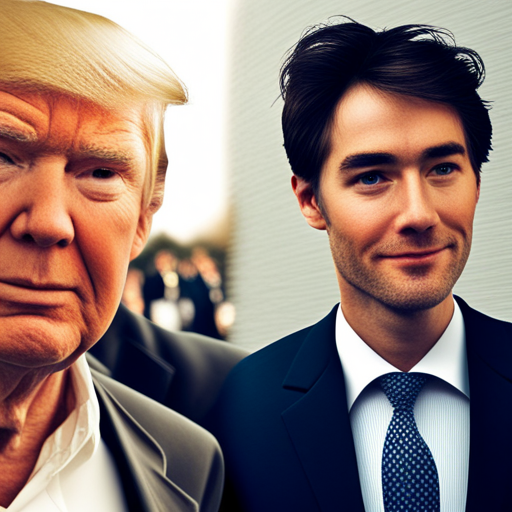Trump Pledges To Free Ross Ulbricht On “Day One” If Elected
In a move that sent shockwaves through both the political and tech worlds, former President Donald Trump pledged this week to commute the sentence of Ross Ulbricht if re-elected in 2024. For those who have forgotten, Ross Ulbricht is the convicted mastermind behind Silk Road, the infamous online marketplace that operated on the Dark Web, facilitating the sale of everything from narcotics to fake IDs. Ulbricht was arrested in 2013 — back when we were all distracted by Harlem Shake videos and Gangnam Style dance-offs.
The Promise and Its Implications
At a rally brimming with his trademark bravado, Trump declared, “On day one, Ross Ulbricht walks free!” Naturally, this announcement has stirred considerable debate. Some view it as a long-overdue correction of a draconian sentence, while others see it as a dangerous precedent.
For Trump, this move appears to be an effort to capture the libertarian wing of the Republican Party and the tech-savvy millennials disillusioned with mainstream politics. It’s a bold gambit, like launching a new social media platform in the age of TikTok and Instagram Reels (oh wait, he did that too).
Who Is Ross Ulbricht?
Ross Ulbricht, aka Dread Pirate Roberts (a name borrowed from “The Princess Bride” — because nothing says “cybercrime” like an 80’s cult classic), was sentenced to two life terms plus 40 years without the possibility of parole. His conviction includes charges of money laundering, computer hacking, and conspiracy to traffic narcotics. The Silk Road was essentially the Amazon of illegal goods, but instead of next-day delivery, you got an FBI raid.
In 2013, when Ulbricht was apprehended, the world was a different place. We were still getting over the loss of Blockbuster Video, Justin Timberlake had just brought sexy back, and Bitcoin was something only the nerdiest of computer geeks talked about. Fast forward a decade, and now even your grandma is asking how to buy Dogecoin.
The Case for Commuting Ulbricht’s Sentence
Supporters of Ulbricht argue that his sentence is disproportionately harsh compared to others convicted of similar crimes. Take, for example, the case of Paul Le Roux, a criminal mastermind whose list of offenses reads like the plot to a particularly convoluted season of “Breaking Bad.” Le Roux managed to receive a much lighter sentence despite his involvement in murder, drug trafficking, and arms dealing.
Proponents of commuting Ulbricht’s sentence point out that non-violent offenders, especially those involved in cybercrimes, often receive more lenient sentences. They argue that while Ulbricht’s actions were illegal and unethical, they did not warrant a punishment harsher than those meted out to violent criminals.
Think of it this way: it’s like giving someone a lifetime ban from Netflix for sharing their password. Sure, it’s against the rules, but isn’t it a bit extreme? Nevermind, this was a bad analogy.
The Political Calculus
Trump’s promise to commute Ulbricht’s sentence is no doubt a calculated move. It’s like when he promised to build a wall and have Mexico pay for it — polarizing but effective at stirring up his base. This time, he’s targeting individuals who view Ulbricht as a martyr for internet freedom and government overreach.
In the grand scheme of things, this pledge fits neatly into Trump’s broader strategy of positioning himself as an anti-establishment figure. Whether you see him as a maverick or a chaos agent, one thing is clear: he knows how to grab headlines. Just as Ulbricht’s Silk Road changed the landscape of online commerce, Trump’s declaration has shifted the conversation around criminal justice reform.
Pop Culture and Public Opinion
The timing of this announcement could not be more interesting. With the rise of cyberpunk aesthetics in mainstream culture (thank you, “Cyberpunk 2077”), and shows like “Mr. Robot” romanticizing hacker culture, public sentiment towards tech crimes is more nuanced than ever.
Moreover, Ulbricht’s story has become somewhat mythical in digital libertarian circles, akin to how “The Matrix” made everyone question reality. There’s a growing narrative that paints Ulbricht as a visionary trapped by an archaic legal system that couldn’t keep up with the fast-paced evolution of the internet.
It’s a narrative that resonates particularly well with younger voters and digital entrepreneurs who see regulation as an enemy of innovation. Like Thanos collecting the Infinity Stones, these voters are looking for leaders who will challenge the status quo and shake up the establishment.
What Happens Next?
If Trump follows through on his promise and commutes Ulbricht’s sentence, it’ll send ripples through the justice system. Critics argue that it may embolden other cybercriminals, suggesting that even the most severe penalties can be undone by political whim. On the flip side, supporters claim it would correct a miscarriage of justice, serving as a reminder that the system can evolve and improve.
There’s also the bigger question of whether such a decision would hold up legally. Presidential commutations and pardons are powerful tools, but they’re not without controversy. It’s a bit like trying to use cheat codes in a video game — sure, you can do it, but expect a lot of backlash.
In the end, Trump’s pledge to free Ross Ulbricht is more than just a headline-grabber; it’s a litmus test for how America views crime, punishment, and the evolving digital landscape. Whether you see Ulbricht as a cyber Robin Hood or a reckless criminal, one thing is certain: this story is far from over.
As we edge closer to the 2024 elections, keep your popcorn handy. If the past few years have taught us anything, it’s that when Donald Trump is involved, the plot is guaranteed to thicken.
Do you think Trump’s pledge to commute Ross Ulbricht’s sentence will gain him support among younger, tech-savvy voters?








Comments
Loading…